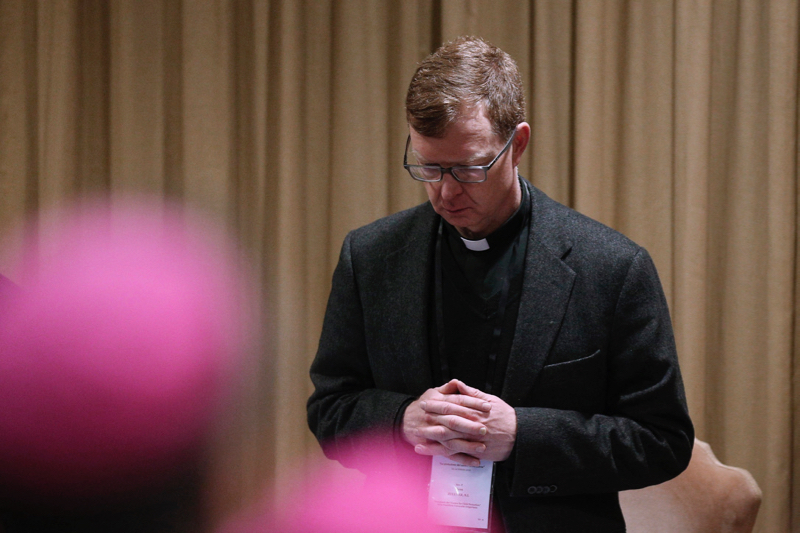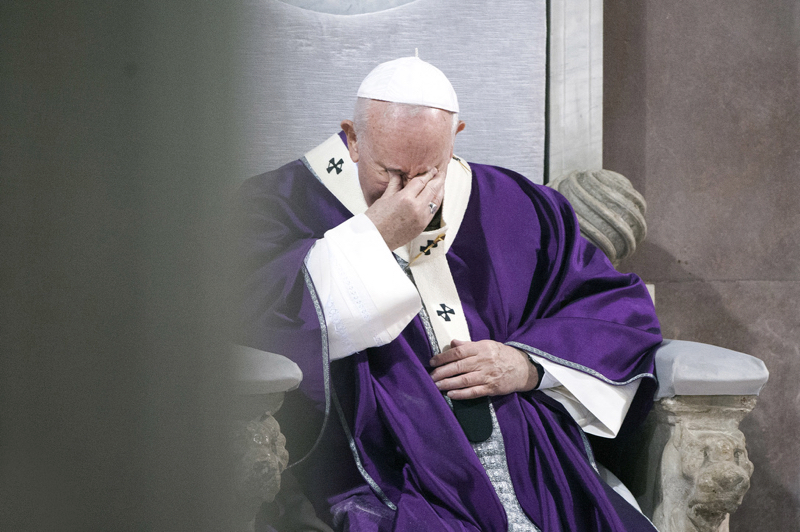Certain US bishops, some remaining anonymous, are engaged in duelling, divergent accounts of their recent ad limina visit with Pope Francis (writes Michael Sean Winters). A story published by the Catholic News Agency on 21 February claimed that “several bishops” told the agency that Francis made disparaging comments about Fr James Martin SJ when they asked about the priest’s meeting with the pontiff last year. Martin is known for advocating a more welcoming stance towards members of the LGBT community. “The Holy Father's disposition was very clear, he was most displeased about the whole subject of Fr Martin and how their encounter had been used,” CNA reported one bishop telling them. “He was very expressive, both his words and his face – his anger was very clear, he felt he'd been used.” Another bishop, also speaking anonymously, agreed. “He told us that the matter had been dealt with; that Fr. Martin had been given a ‘talking to’ and that his superiors had also been spoken to and made the situation perfectly clear to him,” the second bishop said. Santa Fe Archbishop John Wester issued a statement disputing the account. Our meeting with the Pope lasted almost two hours and 45 minutes, so it is difficult for anyone to remember with precision anything that was said,” Wester said. “However, the general tone of the Pope's responses to issues raised with him was never angry, nor do I remember the Pope saying or implying that he was unhappy with Fr Martin or his ministry.” Cheyenne Bishop Stephen Biegler told the National Catholic Reporter that Wester’s recollection matched his own, adding, “we should let Pope Francis speak for himself about such sensitive issues.”
Former South Sudanese rebel leader Riek Machar was sworn in as first vice-president of South Sudan in the capital Juba on Saturday, sealing a peace deal aimed at ending six years of civil war. President Salva Kiir witnessed the State House ceremony. It is hoped that the new unity government will bring an end to the conflict that has killed about 400,000 people and displaced millions. “For the people of South Sudan, I want to assure you that we will work together to end your suffering,” Mr Machar said after taking the oath. He then embraced and shook hands with President Kiir. “We must forgive one another and reconcile,” Mr Kiir said. Pope Francis has said he would like to visit South Sudan this year, if a peace deal holds. Observers in Rome have suggested such a visit could be arranged at an early date.
Poland's leading Catholic weekly has criticised the Church's handling of sexual abuse claims against a Krakow-based bishop (writes Jonathan Luxmoore). "For the first time in Poland, a serving bishop has been accused of sexually molesting a minor", said the front-page article in Tygodnik Powszechny. Bishop Jan Szkodon, 73, a Krakow auxiliary, withdrew from episcopal duties after anonymous claims of abuse two decades previously were cited against him in Poland's mass-circulation Gazeta Wyborcza daily, by a woman who said she had gone public after notifying the Vatican's nunciature and local prosecutors. The Krakow archdiocese spokesman, Fr Lukasz Michalczewski, said Bishop Szkodon would stay away from the southern Polish see while his case was examined by the Vatican's Congregation for Doctrine of the Faith. However, the Tygodnik Powszechny article, written by a prominent Catholic editor, Zbigniew Nosowski, claimed Bishop Szkodon’s superior, Archbishop Marek Jedraszewski, had failed "the test of truth" in handling previous abuse claims. The editor claimed the Krakow archdiocese was seeking to evade responsibility, adding that questions would be asked whether Jedraszewski's predecessor, Cardinal Stanislaw Dziwisz, had also known of "suspicions concerning his auxiliary bishop".
Pressure is growing in Rwanda for an independent investigation into the death of the Catholic church singer Kizito Mihigo. Mihigo, 38, who died in prison on Monday last week, was buried at Rusororo cemetery after a service at Ndera Catholic church. Bishops of the Rwandan Catholic Church have so far declined to comment, in spite of Mihigo's many years of loyal service to the Church. His body was found hanging from a window of the prison where he had been detained three days earlier, after being arrested on allegations of trying to flee the country to join a rebel group. The Rwanda Investigations Bureau claims that Mihigo committed suicide, but his death has sparked off calls for independent investigations.
Pope Francis has used his Lenten message to criticise “empty” chatter among people who follow the news media. In the message, titled “We implore you on behalf of Christ: be reconciled to God”, he refers to Acts 17 in which St Paul, preaching in Athens, says the people there enjoyed nothing more than listening to news: “The dialogue that God wants to establish with each man, through the Paschal Mystery of his Son, is not like that attributed to the inhabitants of Athens,” Francis said. “This type of chatter … characterises the worldliness of all times, and in our day it can also creep into a misleading use of the media.”
Archbishop Anthony Fisher of Sydney said Mass on Thursday last week to open formally the cause of beatification of Eileen O'Connor, the foundress of Our Lady's Nurses for the Poor, who died at the age of 28 in 1921. Born in Melbourne in 1892, Eileen suffered an injury at the age of three that would leave her paralysed for some years and then confined to a wheelchair and in pain for the rest of her life. With Fr Edward McGrath, she founded a ministry to serve the poor in their own homes in honour of the Blessed Virgin Mary.
Fewer than half the Orthodox world's 14 main churches were set to attend a 25-27 February summit on Ukraine's new independent Orthodox church, convened in Jordan with backing from Russia's Moscow Patriarchate. “As we have all recognised, dialogue and reconciliation between brothers is the only way forward,” the summit's organiser, Patriarch Theophilos Giannopoulos of Jerusalem, told church leaders. “This will not be an official synod, but rather a fraternal meeting to inaugurate dialogue on challenges facing the Orthodox community at this critical time - as we continue to use every means of communication with the Ecumenical Patriarchate in order to reach a consensus.” Ecumenical Patriarch Bartholomew confirmed he would not recognise the Amman meeting.
Two gruesome murders in the Mexico City area have outraged a society already plagued by high levels of violence against women and girls. City authorities leaked photos of the mutilated body of Ingrid Escamilla, 25, after she was killed by her male partner. Just days later, a seven-year-old girl named Fámita Aldrighett was found murdered. In Mexico, 10 women die violently every day. Protesters marched in Mexico City and are calling for a women’s strike on International Women’s Day, 8 March. Fátima was kidnapped outside her Mexico City school and reported missing. Her remains were found hidden in a plastic bag on 15 February. Bishop Alfonso Miranda Guardiola, general secretary of the bishops’ conference, tweeted: “We deeply condemn and mourn the murder of Fátima, a sign of the level of degradation that we have reached as a society.”
Bishop Matthew Kukah of Sokoto, northern Nigeria, speaking at the 11 February funeral of murdered seminarian, Michael Nnadi, 18, censured President Muhammadu Buhari’s Government for failing to tackle discrimination against Christians in the North and to fulfil his promise to be tough on terrorism. Michael Nnadi was kidnapped along with three other seminarians on the night of 8 January. The three were later released, but Michael was separated and murdered. “Today, it is more important to be a northern Muslim than a Nigerian,” Bishop Kukah warned.
Pope Francis has recognised the martyrdom of a fellow Jesuit, Salvadoran Father Rutilio Grande, and two lay companions who were murdered in 1977 in El Salvador. The Vatican said the Pope approved a decree noting that they were killed “in hatred of the faith”. Grande was shot in his vehicle more than dozen times along with his sacristan, Manuel Solorzano and young assistant Nelson Lemus by a right-wing death squad. The assassination of Grande shocked the new archbishop of San Salvador, Oscar Romero, into taking up Grande's mission as defender of the poor. Romero was assassinated three years later.
The Western Cape High Court has granted the City of Cape Town an order prohibiting more than 600 refugees living in and around the Central Methodist Mission church from interfering with City officials. The judgment means the refugees cannot do such things as put up temporary shelters, sleep on the pavement, make fires, or wash clothes outside the church. The refugees have until 17 March to oppose the order. Archbishop Stephen Brislin of Cape Town said advocates for refugees and migrants are divided over their cause. “The two key leaders of the group have criminal charges hanging over them, and the original group has been split over a number of issues,” he said. “However, such controversy cannot deflect us from our support for the legitimate and just demands of those who have been displaced for a range of reasons.”
The former Archbishop of Karaganda in Kazakhstan, Jan Lenga, 69, has been banned from preaching and celebrating Mass by the Polish Church for describing Pope Francis as the antichrist and refusing to include him in prayers. “Canon Law empowers the local diocesan bishop to take disciplinary steps which might halt the spread of scandal among the faithful,” Fr Artur Niemira, chancellor of the central Wloclawek diocese, said. “Archbishop Lenga is to refrain from delivering sermons and publicly conducting the liturgy. This same ban applies to contacts with the media.” The ruling was made public following a series of declarations by the retired Ukrainian-born archbishop, who quit his Kazakhstan see in 2011 and now lives in a religious order house at Lichen in central Poland.
Caritas-Europa has highlighted worsening poverty across the European Union in a new report, warning that tens of millions below the poverty line now also face exclusion from housing, education, healthcare and employment. “People experiencing poverty seem to face bigger difficulties accessing services than average citizens - when they do have access, the support the service provides is less helpful to them because the offer is standardised and oriented towards average citizens, rather than adapted to the specific needs of people facing hardship,” the report said. The EU-funded report, "Caritas Cares", said fertility rates were declining across the 27 member-countries, and among 12 recommendations, it called for investment in “younger and older workers”.



 Loading ...
Loading ...